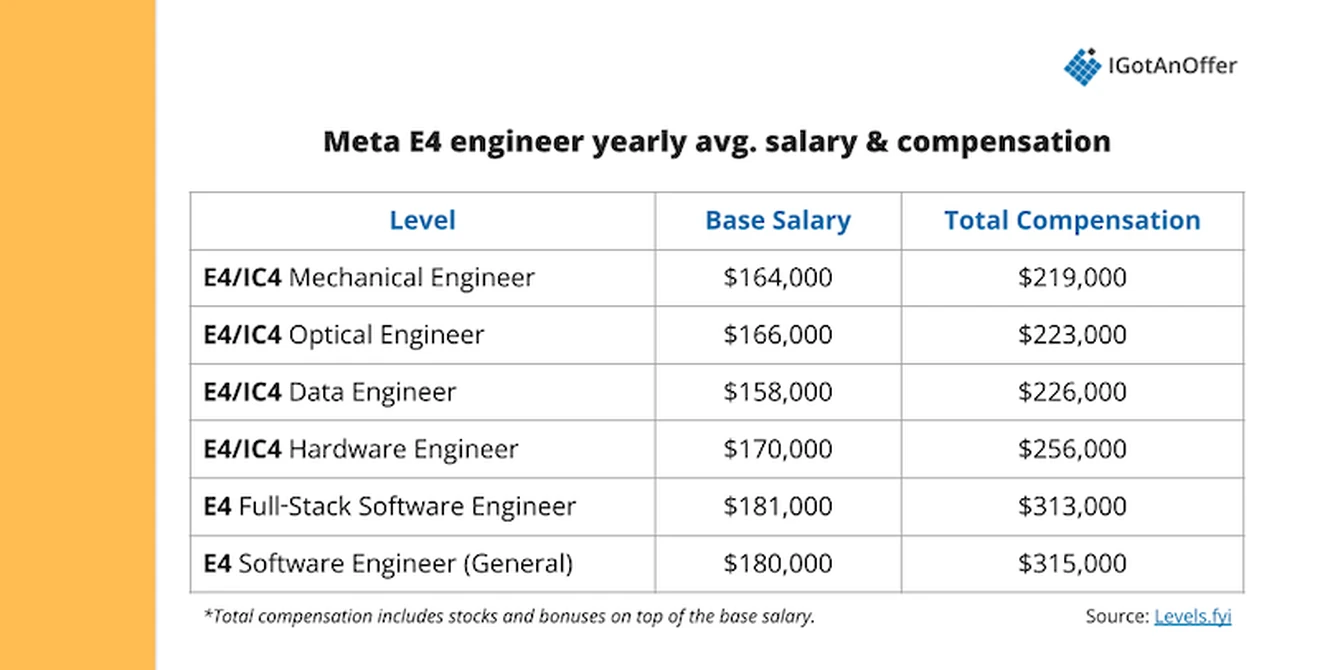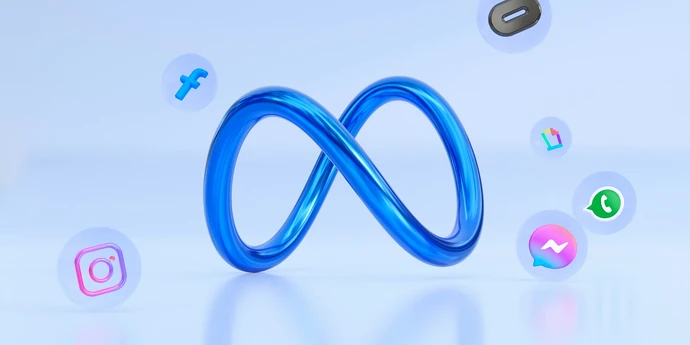Meta E4 interviews for mid-level engineer candidates are tough.
You'll need to prepare thoroughly, and we're not just talking about spending days on LeetCode. With multiple rounds of interviews, you'll be deeply tested on a wide range of skills as a Meta E4 engineer candidate.
The good news is that the right preparation can make a big difference in helping you land a job as an E4 engineer at Meta. To help you get there, we’ve put together the ultimate guide below.
- Role, level, and salary
- Interview process and timeline
- Meta E4 example interview questions
- Improving your interview skills
- Meta E4 preparation plan
NOTE: This guide is written primarily for E4 software engineering (general) candidates, but most of it will also be relevant if you're applying for other E4-level engineer roles.
Let's go!
1. Meta E4 engineer: Role, level, and salary ↑
Before we cover your Meta E4 engineer interviews, let’s take a look at the exact role and level you're applying for.
Individual contributor levels for engineers at Meta start at E3 and go up to E9.
Specifically, Meta E4 engineers are mid-level engineers. They’re one level above entry-level engineers (E3) and one level below senior engineers (E5).
Engineering levels at Meta:
- E3: Entry-level engineer
- E4: Engineer
- E5: Senior engineer
- E6: Staff engineer
- E7: Senior staff engineer
- E8: Principal engineer
- E9: Distinguished engineer
Below, we discuss what exactly a Meta E4 engineer does and how much you can earn at this level, on average.
1.1 What does a Meta E4 engineer do?
As a Meta E4 engineer, you transition from task execution to taking on more technical leadership within your domain.
Your core responsibilities involve:
- Project ownership: You’re expected to be responsible for the end-to-end execution of your assigned engineering scope, such as the creation of a feature, component, or a small project that’s part of a broader initiative led by your senior engineers.
- Cross-team collaboration: At this level, your engineering role involves more collaboration. You’ll frequently engage with relevant teams and stakeholders to stay aligned on technical direction, timelines, and rollout plans.
- Proactive contribution: While you’ll still be led by your senior engineers, you're expected to be significantly more proactive at the E4 level. You’ll be trusted to make design decisions and navigate ambiguous technical problems within your scope.
- Code quality reviews and mentoring: You’ll provide guidance for your peers and less experienced colleagues. This involves reviewing other people’s code, giving constructive feedback, and sharing insight on technical decisions.
Since you’ll be between entry-level and senior-level engineers as a Meta E4 engineer, you form the backbone of Meta’s engineering output. This means:
- You deliver the bulk of feature development, moving projects from specifications to production.
- Your collaboration ensures that features are scalable and aligned across teams.
- You help uphold Meta’s high engineering standards through peer mentorship and code reviews.
At this level, your scope of work is typically assigned and defined by your senior engineers. They will expect you to consistently deliver high-quality outcomes for moderately complex work, with minimal oversight.
1.2 How much does a Meta E4 engineer make?
Meta's competitive salary is among the numerous factors that draw high-performing engineers to the company.
Below are the average salaries and compensation for different types of E4 engineers at Meta. This is based on the available data on Levels.fyi.

How you do in your interviews will help determine what you’ll be offered. That’s why hiring one of our ex-Meta interview coaches can provide such a significant return on investment!
And remember, compensation packages are always negotiable, even at Meta.
If you do get an offer, don’t be afraid to ask for more. If you need help negotiating, use our guide to Meta offer negotiations and consider booking one of our salary negotiation coaches to get expert advice.
2. Meta E4 interview process and timeline ↑
2.1 What interviews to expect
What's the E4 engineer interview process and timeline at Meta? It takes 4 to 8 weeks on average and follows these steps:
- Resume screen
- Recruiter screen
- Technical screen (1 x 45-60 minute interview)
- Full loop onsite interviews (4-5 x 45-minute interviews)
Let's look at each of these steps in more detail:
2.1.1 Resume screen
First, recruiters will look at your resume and assess if your experience matches the open position. This is the most competitive step in the process, as most candidates do not make it past this initial stage.
You can use this software engineer resume guide and browse these Meta resume examples to help tailor your resume to the position you’re targeting.
And if you’re looking for expert feedback, you can also get input from our team of ex-Meta recruiters, who will cover what achievements to focus on (or ignore), how to fine-tune your bullet points, and more.
2.1.2 Recruiter screen
In most cases, you'll start your interview process with Meta by talking to an HR recruiter. This is typically a quick 15-30 minute call. They are looking to confirm that you've got a chance of getting the job at all. Be prepared to explain your background, motivations, and why you align with the E4 engineering role.
You can expect general behavioral questions, such as "Tell me about yourself" or "Why do you want to work at Meta?".
If you get past this first HR screen, the recruiter will then schedule an initial interview with a Meta hiring manager.
One great thing about Meta is that they are very transparent about their recruiting process. Your HR contact will walk you through the remaining steps in the hiring process, and they may also share with you a helpful list of resources you can use to prepare.
2.1.3 Technical screen (1 x 45-60 minute interview)
The next step is the technical screen. This is usually conducted via video call.
You can expect to be asked 2 to 3 coding questions of medium to medium-hard LeetCode difficulty. Some candidates also report getting a couple of behavioral questions thrown in at the end or beginning of the interview.
You'll be using CoderPad for this interview, so it may be worth familiarizing yourself with it beforehand.
2.1.4 Full loop onsite interviews (4-5 x 45-minute interviews)
If you pass the initial interview, you’ll be invited to do onsite interviews (or "full loop" interviews, as Meta calls them).
The full loop interviews are the biggest test for Meta E4 candidates. During this interview loop, you'll have 4 to 5 separate 45-minute interviews with several engineers at Meta.
These interviews typically consist of:
- 2-3 coding interviews
- 1 system design or product architecture interview
- 1 behavioral interview
We'll dive into each of these interviews in Section 3.
2.2 What happens behind the scenes
Your recruiter leads the process for taking you from one stage to the next.
Here's what happens behind the scenes at each stage we discussed in the previous section:
- After the technical interview, your interviewer has 24 hours to submit their ratings and notes on Meta’s internal system. Your recruiter then reviews the feedback. Depending on how well you've done, they’ll decide whether or not to move you to the full loop interviews.
- After the full loop interviews, your various interviewers will make a recommendation on whether or not to hire you. Your recruiter then compiles your packet (interview feedback, resume, referrals, etc.) If they think you can get the job, they will present your case at the next internal candidate review meeting. These meetings are for assessing all candidates who have recently finished their interview loops and are close to getting an offer.
- During the candidate review meeting, they will analyze your packet and discuss any possible concerns. Your interviewers will be invited to join your candidate review meeting, but they’ll usually attend only if there's strong disagreement on the grades you received (e.g., 2 no-hires, 2 hires). At the end of the candidate review meeting, a hire or no-hire recommendation will be made for the hiring committee’s consideration. (However, if the team can't reach a consensus on whether or not to hire you, you may be asked to do a follow-up interview to settle the debate.)
- The hiring committee includes senior leaders from across Meta. This step is usually a formality, and the committee will follow the recommendation of the candidate review meeting. The main focus here is fine-tuning the exact level (and therefore, compensation) you will be offered.
It's also important to note that hiring managers and people who refer you have little influence on the overall process. They can help you get an interview at the beginning, but that's about it.
3. Meta E4 example interview questions ↑
As explained in Section 2, you'll face 4 or 5 interviews at the full loop stage, lasting 45 minutes each.
To help you perform at your best, we analyzed over 170 interview questions reported by Meta candidates on Glassdoor and identified the types of questions most frequently asked.
Here are the question types you can expect for Meta E4 engineer interviews:
While the questions below are specific to software engineers, you will likely encounter similar questions and coding challenges for other E4 engineer roles at Meta.
Where necessary, grammar and phrasing have been edited to make questions easier to understand.
3.1 Coding questions
Meta engineers solve some of the most difficult problems the company faces with code. As a Meta E4 engineer, you need to be a strong problem-solver, with robust coding skills that set the standard for your less experienced team members.
You'll have at least three coding interviews at Meta. Most Meta E4 engineer candidates report solving 2 to 3 problems during the technical screen. For the full loop interviews, candidates report doing up to 3 coding rounds, with 2 to 3 problems per round.
In terms of difficulty, you can expect medium to medium-hard LeetCode questions, according to this Reddit user. However, other users also report receiving some easy LeetCode questions.
Either way, you’ll need to show that you think in a structured way and write code that's accurate, bug-free, and fast.
Here are the most common question types asked in Meta coding interviews and their frequency.
In general, ex-Meta EM Luis’s advice is to focus on communicating your ideas: “Make sure you’re not trying to impress your interviewer by solving the problem in isolation. Establish rapport.”
He also says not to worry too much if you make a mistake. The important thing is to keep going and ask questions to make sure you and your interviewer are aligned on the problem scope.
As long as you can demonstrate strong problem-solving and communication skills, you have a chance.
Below, we’ve curated some common examples for each question type, based on data from Glassdoor. We’ve also included some free solutions.
Coding interview questions asked at Meta E4 interviews
1. Arrays / Strings
- "Given an array nums of n integers where n > 1, return an array output such that output[i] is equal to the product of all the elements of nums except nums[i]." (Solution)
- "Given a non-empty string s, you may delete at most one character. Judge whether you can make it a palindrome." (Solution)
- "Given a string S and a string T, find the minimum window in S which will contain all the characters in T in complexity O(n)." (Solution)
2. Graphs / Trees
- "Given a Binary Tree, convert it to a Circular Doubly Linked List (In-Place)." (Solution)
- "Implement an iterator over a binary search tree (BST). Your iterator will be initialized with the root node of a BST." (Solution)
- "Check whether a given graph is Bipartite or not." (Solution)
3. Dynamic Programming
- "Given a list of non-negative numbers and a target integer k, write a function to check if the array has a continuous subarray of size at least 2 that sums up to a multiple of k, that is, sums up to n*k where n is also an integer." (Solution)
- "Say you have an array for which the ith element is the price of a given stock on day i. If you were only permitted to complete at most one transaction (i.e., buy one and sell one share of the stock), design an algorithm to find the maximum profit." (Solution)
- "You are given a list of non-negative integers, a1, a2, ..., an, and a target, S. Now you have 2 symbols + and -. For each integer, you should choose one from + and - as its new symbol. Find out how many ways to assign symbols to make the sum of integers equal to target S." (Solution)
4. Search / Sort
- "We have a list of points on the plane. Find the K closest points to the origin (0, 0)." (Solution)
- "Given an array of meeting time intervals consisting of start and end times [[s1,e1],[s2,e2],...] find the minimum number of conference rooms required." (Solution)
5. Linked lists
- "A linked list is given such that each node contains an additional random pointer which could point to any node in the list or null. Return a deep copy of the list." (Solution)
- "Given a singly linked list L: L0?L1?…?Ln-1?Ln, reorder it to: L0?Ln?L1?Ln-1?L2?Ln-2?…" (Solution)
6. Stacks / Queues
- "Implement the following operations of a queue using stacks." (Solution)
Finally, we recommend reading our guide on Meta coding interviews for more in-depth preparation for these types of questions.
3.2 System design & product architecture questions
Meta’s products (such as Facebook, Instagram, and WhatsApp) all have over 1 billion monthly active users. Therefore, you’ll need to be able to design systems that are highly scalable.
For Meta E4 engineering roles, many candidates (like this Blind user and this Reddit user) report getting system design interviews. However, a few candidates like this Reddit user have also reported getting product architecture interviews.
It will depend on your exact E4 engineering role. You may get to choose, or your interviewers may decide for you.
To better prepare for this round of interviews, you should know the distinction between system design and product architecture interviews.
So, what’s the difference? According to Sidhanshu (ex-Meta senior software engineer):
- System design interviews ask you to deal with distributed systems at a large scale. Its purpose is to assess your ability to build software systems or end-to-end systems that solve a problem or support an end-user product. Scalability is the main concern. You may also want to think about availability, partition tolerance, reliability, storage, databases, core systems, etc.
- Product architecture interviews may be more appropriate for candidates who are used to working on user-facing products. The overall user experience is the main priority. Think APIs, data modeling, client and server interactions, etc. Its focus is typically on the more holistic parts of building a software solution, and less on the back-end components.
Whether you face a system or product design interview, the questions will be very open-ended and feel more like a discussion. You'll want to show that you can both be creative and structured at the same time.
Expect your interviewer to ask follow-up questions regarding various aspects of your proposed design. Talk about alternative approaches if prompted, and be prepared to go into low-level details.
Whichever of the two interviews you get, prepare to visualize your thoughts on Excalidraw (Meta's preferred tool for this) as you discuss the questions posed by your interviewers.
Your goal is to show that you can be creative and structured at the same time. You'll be assessed less on the exact solution you build and more on the way you consider trade-offs, justify your decisions, and take a structured approach.
“You need to show you understand the problem and can work at scale, with a way to calculate the impact of your decisions,” Luis says.
Here are some common questions you may encounter, as reported on Glassdoor:
Example system design questions asked at Meta E4 interviews
- How would you design Instagram / Instagram Stories?
- How would you design a messaging app like WhatsApp or Telegram? (Watch an expert's answer)
- How would you design Facebook Messenger?
- How would you design Facebook's live update of comments on posts?
- How would you design an online collaborative editor (e.g., Google Docs)?
- How would you design a typehead feature (e.g,. Google search autocomplete)?
- How would you design Twitter's trending topics?
- How would you design a distributed Botnet?
- How would you design a system that can handle millions of card transactions per hour?
- How would you design security for Meta's corporate network from scratch (Security team interview)?
Example product architecture questions asked at Meta E4 interviews
- Design a service or product API.
- Design a chat service or a feed API.
- Design an email server.
For more in-depth guidance, check out our guides to Meta system design interviews and Meta product architecture interviews.
3.3 Behavioral questions
Meta uses behavioral questions to test your soft skills. They look for well-rounded engineers who are proactive and able to collaborate well with cross-functional partners and teams.
At the E4 level, expect questions regarding your experience with leadership, taking initiative, cross-collaboration, conflict resolution, and handling setbacks or challenges in previous roles.
You might also be asked about past projects where you exercised independent judgment and technical autonomy. While you won’t be expected to have already led entire projects like a senior engineer, Meta interviewers will want to know if you have experience delivering small to medium-scope features end-to-end.
For these questions, you’ll want to demonstrate that you have both technical skills and leadership potential.
Go high-level first before going into details. Highlight how you collaborated cross-functionally and found opportunities to make an impact.
You won’t be asked to make a presentation, but be prepared to explain it visually on a whiteboard or Excalidraw.
Example behavioral questions asked at Meta E4 interviews
- Tell me about yourself.
- Why are you interested in joining Meta?
- Why are you looking for a new role?
- Tell me about a time you failed.
- Tell me about your worst boss and why they were bad.
- Tell me about the greatest accomplishment of your career so far.
- Tell me about a time you were given feedback that was constructive.
- Tell me about a time you showed leadership outside of a leadership role.
- Tell me about the time you experienced conflict in a project and how it was resolved.
- Tell me about a recent/favorite project and some of the difficulties you had.
- Describe a technically challenging project where you collaborated with other teams.
- What was your role in the project?
- Did you do any technical planning or product roadmapping for it?
- How did you measure the success of your project?
Check out our guide to Meta behavioral interview questions to learn more.
4. Improving your interview skills ↑
You might be a fantastic engineer, but that may not necessarily be enough to ace your interviews at Meta. Interviewing is a skill in itself.
Let’s look at some key tips to make sure you present yourself in interviews as best you can.
4.1 Ask clarifying questions
Often, the questions you’ll be asked will be quite ambiguous, so make sure you ask questions that can help you clarify and understand the problem. Most of the questions will focus on testing your technical proficiency.
4.2 Be conversational
Meta wants to know if you have excellent communication skills. Make sure you approach the interview like a conversation and try to build rapport with your interviewer.
4.3 Think out loud
You need to walk your interviewer through your thought process before you actually start coding or designing a system. Meta also recommends that you talk even while coding, as they want to know how you think. Your interviewer may also give you hints about whether you’re on the right track or not.
4.4 State and check assumptions
You need to explicitly state assumptions and check with your interviewer to see if those assumptions are reasonable.
4.5 Present multiple possible solutions
Before you code, present multiple possible solutions if you can. Meta wants to know your reasoning for choosing a certain solution.
4.6 Be honest and authentic
Be genuine in your responses. Meta interviewers appreciate authenticity and honesty. If you faced challenges or setbacks in a past work situation, discuss how you improved and learned from them.
4.7 Focus on Meta’s values
Familiarize yourself with Meta’s core values and align your behavioral responses with them. Meta values certain attributes such as passion for technology, collaboration, and focus on the user. We talk about this more in Section 5.1 below.
4.8 Brute force, then iterate
When coding, don’t necessarily go for the perfect solution straight away. Meta recommends that you first try and find a solution that works, then iterate to refine your answer.
4.9 Keep your code organized
Make sure to keep your code organized so your interviewer won’t have a hard time understanding what you’ve written. Meta wants to see that your code has captured the right logical structure.
4.10 Get comfortable with coding on various mediums
Meta typically asks interviewees to code in CoderPad if the interview is done online. But if the interview is in person, you might be asked to code on paper or a whiteboard. You can check with your recruiter if you’re not sure which medium to use.
5. Meta E4 preparation plan ↑
Now that you know what questions to expect, let's focus on how to prepare.
The performance bar at Meta is extremely high. Some people even go as far as quitting their jobs to prepare for interviews full-time. This is extreme and not what we recommend doing, but it shows how much effort some candidates are ready to put in.
We've coached more than 15,000 people for interviews since 2018. Below is our four-step prep plan for Meta.
5.1 Learn about Meta’s culture
Most candidates fail to do this. But before investing tens of hours preparing for an interview at Meta, you should take some time to make sure it's actually the right company for you.
Meta is prestigious, so it's tempting to ignore that step completely. But in our experience, the prestige in itself won't make you happy day-to-day. It's the type of work and the people you work with that will.
If you know engineers who work at Meta or used to work there, it's a good idea to talk to them to understand what the culture is like. In addition, we would recommend reading the following:
- Meta's 6 core values
- Engineering at Meta
- Facebook’s hacker culture (by Mark Zuckerberg, via Wired)
- Meta’s annual reports and strategy presentations (by Meta)
- Meta's approach to tech trends (by CB Insights)
- Meta org culture analysis (by Panmore Institute)
5.2 Practice by yourself
As we've outlined above, you'll have to prepare for different types of questions for Meta E4 interviews.
Here’s a complete list of deep-dive articles that will help you better prepare for each question category:
- Coding: Meta coding interview prep
- System design: Meta system design interview
- Product architecture: Meta product architecture interview
- Behavioral: "Why Meta?" interview question, Meta behavioral interview questions, guide to technical retrospectives by Tony Wu (ex-Meta)
Depending on the exact E4 engineer domain you’re aiming for, you may also want to check these interview guides on specific Meta engineering roles:
- Meta software engineer interviews
- Meta production engineer interviews
- Meta data engineer interviews
- Meta machine learning engineer interviews
- Meta front-end engineer interview
Aiming to land a position at a higher level? Read our other Meta engineer prep guides:
Once you’re in command of the subject matters relevant to your target position and company, you’ll want to practice answering questions.
But by yourself, you can’t simulate thinking on your feet or the pressure of performing in front of a stranger. Plus, practicing alone doesn’t prepare you for unexpected follow-up questions and doesn’t provide feedback.
That’s why many candidates try to practice with friends or peers.
5.3 Practice with peers
If you have friends or peers who can do mock interviews with you, that's an option worth trying. It’s free, but be warned, you may come up against the following problems:
- It’s hard to know if the feedback you get is accurate
- They’re unlikely to have insider knowledge of interviews at your target company
- On peer platforms, people often waste your time by not showing up
For those reasons, many candidates skip peer mock interviews and go straight to mock interviews with an expert.
5.4 Practice with experienced Meta interviewers
In our experience, practicing real interviews with experts who can give you company-specific feedback makes a huge difference.
Find a Meta interview coach so you can:
- Test yourself under real interview conditions
- Get accurate feedback from a real expert
- Build your confidence
- Get company-specific insights
- Learn how to tell the right stories, better
- Save time by focusing your preparation
Landing a job at a big tech company often results in a $50,000 per year or more increase in total compensation. In our experience, three or four coaching sessions worth ~$500 will make a significant difference in your ability to land the job. That’s an ROI of 100x!
Click here to book mock interviews with experienced Meta ex-interviewers.















